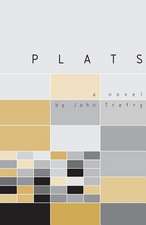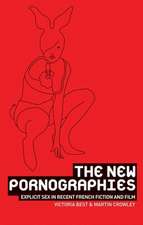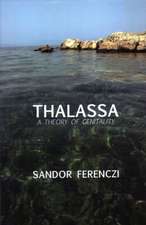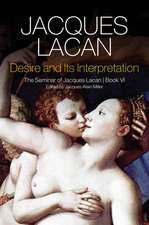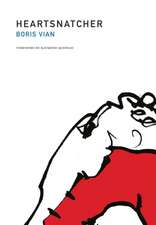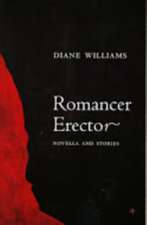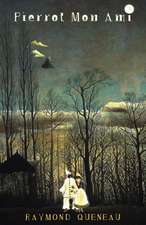Journey to the End of the Night
Autor Louis-Ferdinand Céline Traducere de Ralph Manheimen Limba Engleză Paperback – 28 sep 2012
Preț: 65.05 lei
Nou
Puncte Express: 98
Preț estimativ în valută:
12.45€ • 12.100$ • 10.30£
12.45€ • 12.100$ • 10.30£
Carte disponibilă
Livrare economică 14-28 martie
Livrare express 27 februarie-05 martie pentru 24.70 lei
Preluare comenzi: 021 569.72.76
Specificații
ISBN-13: 9781847492401
ISBN-10: 1847492401
Pagini: 432
Ilustrații: ill
Dimensiuni: 128 x 198 x 30 mm
Greutate: 0.36 kg
Editura: Alma Books COMMIS
Colecția Alma Classics
Locul publicării:London, United Kingdom
ISBN-10: 1847492401
Pagini: 432
Ilustrații: ill
Dimensiuni: 128 x 198 x 30 mm
Greutate: 0.36 kg
Editura: Alma Books COMMIS
Colecția Alma Classics
Locul publicării:London, United Kingdom
Notă biografică
Louis-Ferdinand Céline was one of the most controversial authors of the twentieth century, a writer who mixed realism with imaginative fantasy, and like his contemporary Henry Miller, an iconoclast who shocked and frightened many of his readers. Céline, the pen name of L.F. Destouches, was a doctor in poor Parisian districts whose experience of the misery and chicanery of the poor gave him a jaundiced view of humanity that he poured into prose that is comic as well as often frightening and obscene.
Recenzii
Journey to the End of the Night, first published in 1932, is one of the greatest novels of the 20th century... It could be said that without Céline there would have been no Henry Miller, no Jack Kerouac, no Charles Bukowski, no Beat poets.
The blackest comedies can baffle readers not trained, or just unwilling, to recognise the comic in human extremis. It's obscene, rock-bottom laughter, disabused of all idealism, that provides the tonic Céline speaks of.
My favourite French classic has to be Journey to the End of the Night by Louis-Ferdinand Céline. It's an epic that takes you all around the world, but the centre of the world is Paris, or Céline's delirious, slightly hallucinatory, incredibly poetic vision of it.
Céline's expletive-laden, first-person narration influenced Henry Miller, Charles Bukowski and Beat poetry. But the influences do not stop there: one cannot help but appreciate the palpable influence that the author's anti-war invective and defence of cowardice had on Joseph Heller's Yossarian and Kurt Vonnegut's Billy Pilgrim respectively. But, the interest of those he influenced aside, Céline's novel remains as readable and vital today as it was in the 1930s.
Born in the shadow of entrenched realism and naturalism, Céline ripped up the textbook. He wasn't the first French writer to use a colloquial style, but he was the first to use it so relentlessly and powerfully, to create a brand, the rant, whether it was delirious, lyrical or raging.
The blackest comedies can baffle readers not trained, or just unwilling, to recognise the comic in human extremis. It's obscene, rock-bottom laughter, disabused of all idealism, that provides the tonic Céline speaks of.
My favourite French classic has to be Journey to the End of the Night by Louis-Ferdinand Céline. It's an epic that takes you all around the world, but the centre of the world is Paris, or Céline's delirious, slightly hallucinatory, incredibly poetic vision of it.
Céline's expletive-laden, first-person narration influenced Henry Miller, Charles Bukowski and Beat poetry. But the influences do not stop there: one cannot help but appreciate the palpable influence that the author's anti-war invective and defence of cowardice had on Joseph Heller's Yossarian and Kurt Vonnegut's Billy Pilgrim respectively. But, the interest of those he influenced aside, Céline's novel remains as readable and vital today as it was in the 1930s.
Born in the shadow of entrenched realism and naturalism, Céline ripped up the textbook. He wasn't the first French writer to use a colloquial style, but he was the first to use it so relentlessly and powerfully, to create a brand, the rant, whether it was delirious, lyrical or raging.




